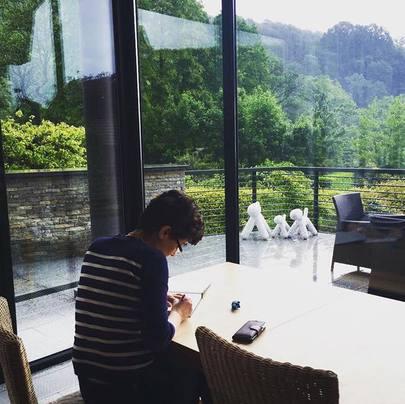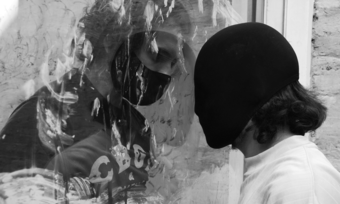Ni de aquí, ni de allá / From neither here nor there
Se me ha pedido incluya un poco sobre mis opiniones acerca el estado actual de el teatro Latino. Después de semanas mandando el ensayo original a editores, escritores, autores y a amigos, decidí que en el ensayo original se encontraba un vacío tremendo. No era posible expresarme en idioma prestado, y aunque trabajo y escribo en Ingles—el simple hecho de escribir acerca de mi identidad, me fue imposible en esa lengua. Escribo en Español pues es aquí en oración formada con verso de mi lengua natal que yace mi ser. Como lo dijo Borges, “Pensemos que si escribir es difícil, mucho más difícil es escribir primero en un idioma extranjero y luego traducirlo.” Tengo tanto tiempo entre países, que en realidad ya no soy ni de aquí, ni de allá, pero aun así, fue en este idioma que di con mi verdadera opinión acerca de el teatro Latino.
Creo que es hora de que hablemos honestamente de lo que cae mal, lo que falta y de lo que sobra en el teatro Latino.
Lo que cae mal, es la obsesión con la identidad. Presiento que debemos hablar honestamente sobre la paradoja de este tema. Por ejemplo, soy mujer gay Mexicana, si--pero significa esto entonces que solo eso define mi trabajo artístico? He tenido experiencias en las que se me a pedido agregarle “pochadas” a mi trabajo, dicen que ‘para que sea latino—para que me represente.’ Y si no lo hago entonces no estoy escribiendo como latino? Me parece ilógico que se espere del latino escribir específicamente sobre la ‘experiencia latina’ y que esta tal experiencia se defina por un grupo tal vez anticuado o con ideas de siglo pasado. Como artista y escritora, todo mi trabajo fue, es y seguirá siendo Mexicano porque yo lo soy. No es necesario escribir en idiomas mutilados, tener en su elenco a gente de cierta raza, o escribir sobre mojados, revolucionarios, pachucos o aztecas para ser parte de la comunidad teatral Latina. O si? Si es así, entonces pregunto: cuales se suponen que son los temas que debo abarcar como escritora para que el mundo literario y de teatro me considere ‘latina’? Siento que esto de identificarse como Latino en el mundo artístico es como ser el perro que persigue su cola. Es un ciclo sin fin entre quienes somos y como debemos definirnos. Y que si mejor nos relajamos un poco y dejamos de perseguir la cola? Personalmente me interesa mas el ser artistas que el de definirme como tal.
Me metí a esto de la escritura porque quería abarcar con temas mucho mas interesantes que el definir quien soy. No me doy tanta importancia. Escribo con tal de explorar temas acerca de la naturaleza, lo natural, nuestra relación con la fauna, acerca el teatro infantil y mas que nada con tal de investigar que hay detrás de la conciencia colectiva que nos une como artistas nacido en las Américas, como ejercientes en hemisferio oeste (no específicamente al sur de una frontera, sino como norte, centro, sur).
Pero en fin, por eso estoy aquí. Por que me interesa, si es que es necesario identificarme, identificarme con una familia Latina que escuche y este dispuesta a incluir en sus relatos este ensayo en Español. Lo que me lleva a mi siguiente punto de vista.
Lo que falta es la invitación en este idioma. Existen aquellos que como yo tienen la capacidad de escribir en ambos idiomas y que también deben ser parte de la conversación que ultimadamente nos afectara a todos como artistas y escritores para el escenario. Me parece de buen gusto invitar a otros, que como yo, sean artistas trasplantes o con doble ciudadanía, que busquen oportunidades en el escenario para expresarse en este, su idioma. El teatro Latino necesita mas oportunidades para aquellos escritores que buscan cantar su verso y no en idioma prestado. Si lo que se quiere es declarar el deber de ser una comunidad, yo estoy aquí para recordarnos que estamos dejando a varios fuera de esta conversación. Invitémoslos ahora, de esta manera.
Ahora, lo que sobra. En mi opinión, sencillamente, sobra el morbo. Que casualidad que de repente están saliendo escritores con su nueva obra acerca la violencia en Ciudad Juárez. La violencia que esta destruyendo a mi ciudad natal no debe ser la razón por la que el joven escritor Estadounidense lance su carrera. Llámenme defensora de mi territorio, lo soy, y estoy dispuesta a hablar frente a frente sobre este tema en cualquier ocasión. Existen un par de razones por las que creo que no debemos forjar nuestras obras con el hierro de un México en llamas. Hace un par de días, recordé una conversación que tuve con una mujer de Chihuahua. Yo estaba por lanzar una obra titulada “The Circuz,” cuya representa a el cartel como un circo y a los narcos como payasos. La mujer me dijo, “No, mira hija, cuando vea en el escenario una sandunga pero de las buenas, un huapango sabroso, cuando vea a nuestro México como lo bello que es—que fue, y que puede ser--- y no como lo cochino que esta, alomejor iría al teatro. Para que te pones a escribir de las bestias que se están comiendo a nuestro país? Para que le andas echando porras con narco-corridos—por algo Dios no le dio alas a los alacranes—no te pongas a darles voces!” Desde ese entonces no escribo sobre ese tema. Y en realidad, no puedo apoyar ni aplaudirle a quien si lo hace. La segunda razón se trata de darle oportunidad a la ciudad en si a que se reconstruya. Dejemos que Juárez se escriba solo. Lo necesita. Y existen muchísimos autores, pintores, cantantes, y músicos con talento de poca madre que están determinados a hacerlo. No creo que debemos ser nosotros, los que nos encontramos en este país los que nos aprovechemos al escribir relatos que no nos pertenecen, simplemente porque nos llamamos Latinos. Es necesario ser responsables de nuestras acciones, nuestras palabras y nuestras tareas y pensar en que forma, al definir a un país que tal vez conozcamos y tal vez no, estas tendrán efecto a la larga.
Tengo tanto tiempo repartida entre países que soy, como dicen “ni de aquí, ni de allá.” Espero abrir puertas y corazones y que se tengan mas conversaciones sobre estos temas hasta ahora, no se han tenido—y si acaso estas conversaciones ya existen y me las he perdido, les mando mil disculpas por ser la escritora despistada pero apasionada que soy.

Photo courtesy of Georgina Escobar.
***
I write in Spanish for it is here in between lines and sentences formed by verses of my native tongue that my true self lives.
I have been asked to include some of my opinions regarding the actual state of what is known as Latino theatre. After weeks of pondering and sending my drafts off to editors, writers, authors, friends, I decided that the drafts were missing the point. There was a vacuum in them. It was impossible for me to express in a borrowed language, and though I work and write in English—the very thought of expressing my thoughts on identity in a language other than Spanish felt false. As the Argentine writer Jorge Luis Borges puts it, “Think that if writing is difficult in itself, it is much more difficult to write first in a foreign language and then translate it.” And it was in this way that I stopped fighting with language and allowed myself to be taken over by my own idiom, one that is from neither here nor there. And there, I found some things that I want to engage in conversation about Latino theatre.
There are things that, personally, hit a wrong chord, things that are missing, and things that are superfluous currently in what I know of Latino theatre.
What hits the wrong chord is the obsession with identity. I think we should engage in conversations regarding the paradox around this theme. For example, I am a gay Mexican woman, yes—but does that mean that it has to be what defines my writing? I have had experiences in which I was advised to add Spanglish to my work, “so it can be Latino—so it can represent me.” And if I don’t do it, then am I not writing as a Latina? It seems illogical to me that Latino writers are expected to write about the “Latino experience,” and that such experiences are defined perhaps by a group or ideas that are outdated.
As an artist and writer, all of my work was, is and will always be Mexican because that is what I am. It is not necessary to mutilate language, cast people of certain race, or write about illegals, revolutionaries, pachucos or Aztecs to be part of the Latino theatre community. Or is it? If that is the case, then I need to ask questions about what themes I am expected to write about so that the literary and theatre world will consider me Latino. I feel like the theme of identity in theatre-making is as productive as watching a dog chase its tail. It’s an endless cycle of who we are and how we define ourselves to others. Personally, I am more interested in being an artist than in defining my art.
I got into this writing thing because I wanted to deal with much more interesting things than defining who I am. I don’t give myself that much importance. I got into this because I wanted to explore the natural—nature, animals, theatre for youth, and most importantly to explore what is behind this collective consciousness that makes us American artists, in terms of the Western Hemisphere (not specific to places divided by borders, a north, a central, a south.)
But alas, that is why I am here. Because I want, if the necessity to identify myself is pressing, to identify myself as part of a Latino family that listens, and that is willing to include in our narrative more works in Spanish, including this blog. Which takes me to my next point.
What is missing right this moment in Latino theatre is the Spanish invitation to participate in these conversations. There are those of us that can and want to write in both languages, separately, and those who write primarily in Spanish who should be part of this conversation, since it ultimately affects us all as writers for the stage. There should be more done to invite others that have different experiences; that, like me, are transplants or dual citizens, and that seek opportunities on stage to express themselves in their language. Latino theatre needs to foster more opportunities for writers who don’t write primarily in a borrowed language. If there is a need to declare that Latinos are a community and a family, then let me say that there are some who are being left out of this conversation. Let me invite them now, in this way.
Now, to what is superfluous. I find it strange that lately I have heard of writers who are launching their new projects about Ciudad Juárez. The violence that is destroying my native city should not be the reason for the young writer in the US to launch their career. (Call me territorial. I am, and I am more than willing to speak face to face about my feelings on this subject.) But there are a couple reasons why I strongly believe that we shouldn’t be shaping stories out of Mexico’s current state.
Just a few days ago, I remembered a conversation I had with an older woman from Chihuahua. This was at a time when I was drafting a play titled The Circuz, in which I compared the cartels to circuses and the narcos to clowns. The woman said, “Why aren’t you writing about our sandungas or huapangos, why aren’t you writing about how beautiful Mexico is, how beautiful it was, and how wonderful it can be? Don’t write about these beasts that have taken our country. Why would you praise the narco by telling their stories? Why give them existence by listening to their narco-corridos? There’s a reason why god didn’t give scorpions wings—don’t you give them a voice.” I have not written about violence since. And I cannot support or stand behind anyone who is.
The second reason is about giving credit where credit is due. Let Juárez write itself. It sorely needs it. There are brilliant authors, painters, musicians, and creators who are determined to heal the city, to make a difference. I do not think those of us who are living in this country should take advantage of writing stories that do not belong to us, simply because we think we have a right by calling ourselves Latinos. Let us be responsible with our words and our projects and think carefully about the effects it may have on a country that we may or may not know.
I have straddled both countries for so long that I am, truly, from neither here nor there. I do hope, however, that I can open the doors and hearts to conversations that perhaps need to happen, and if these conversations already exist—then I simply don’t know they do and extend my apologies for being me.








Comments
The article is just the start of the conversation—we want to know what you think about this subject, too! HowlRound is a space for knowledge-sharing, and we welcome spirited, thoughtful, and on-topic dialogue. Find our full comments policy here
Hola Gerogina. Te contesto como otro escritor mexicano trabajando desde el extranjero. A veces también me he sentido "ni de aquí, ni de allá", y me dio mucha curiosidad ver cómo otro escritor mexicano ha lidiado con esta situación.
"Lo que cae mal, es la obsesión con la identidad." "Me metí a esto de la escritura porque quería abarcar con temas mucho mas interesantes que el definir quien soy"
De acuerdo que no se debe limitar los temas simplemente porque uno es Latino y la gente espera cierto tipo de lenguaje y temática. Sin embargo, la identidad de mucha gente como inmigrante o descendientes de inmigrantes sigue siendo un tema fértil para el tratamiento dramático. Las personas nacidas en Estados Unidos, pero con familias con raíces en Latinoamérica, se encuentran entre dos mundo muy distintos e inseparables. Tú y yo, como Mexicanos, hemos mas o menos decidido partir y encontrarnos en otra cultura ajena. Se me hace un poco injusto que "te caiga mal" esta situación que por lo general es mucho más complicada y difícil para los mexicoamericanos. Tú misma dices que no tienes está crsis ya qye tú y tu trabajo siempre será mexicano; pero ahora te encuentras en un lugar donde esa claridad sobre tus raíces es una excepción.
"Lo que falta es la invitación en este idioma." "El teatro Latino necesita mas oportunidades para aquellos escritores que buscan cantar su verso y no en idioma prestado"
Aquí estoy completamente en desacuerdo. No me hace mucho sentido el exigir que en Estados Unidos, un país de habla inglesa, se monten obras en otro idioma. De acuerdo, hay una población que no habla inglés, y tal vez hay oportunidades para hacerles llegar la cultura motando obras en su idioma nativo (traducciones de obras Americanas, por ejemplo). Pero de ahí a llamar a los escritores a producir más obras en Español se me hace absurdo. Si quieres escribir en Español, mejor hazlo en México o España. Y lo digo como un escritor mexicano que viven en un país de habla inglesa.
"Ahora, lo que sobra. En mi opinión, sencillamente, sobra el morbo"
Concuerdo que es triste que haya gente cínica que se quiera aprovechar de una tragedia como la de Juárez para avanzar su carrera. Sin embargo, cuando un arista crea una obra, al recibirla creo que deberíamos de partir de un lugar de aceptación y entendimiento, no de un lugar de sospecha sobre sus intenciones.
En cuanto a estar dictando sobre cuáles temas se deben de escribir y cuáles no, se me hace un ejercicio poco productivo. Los escritores, cuando escriben del alma, van a escoger el tema que les late. El que un tema sea demasiado doloroso o difícil, no se me hace suficiente escusa como para intentar disuadir a artistas abordarlo. Esto me hace pensar en las dictaduras militares que hubo en Latinoamérica en las últimas décadas y cómo todavía siguen dominando el teatro Latinoamericano, y cómo este teatro sigue siendo una representación válida de sociedades traumadas por la violencia.
El tratar de presentar un tema en el escenario no es simplemente dándole "voz a los alacranes". Es una manera de lidiar con momentos y hechos que nos han traumado de manera colectiva, y a la vez recuperar la humanidad que esos crímenes han intentado robarnos. A veces siento que suena como la Secretaria de Turismo de México el pedir que los artistas no hablen de lo malo de México. El país se va a recuperar y va a sanar con o sin las obras de teatro estadounidenses, no creo que esto tenga tanto efecto como sugieres.
--------------
Hi Georgina. I'm writing to you as another Mexican writer workign abroad. I've also sometimes felt "from neither here not there", and I was quite curious to see how another Mexican writer has tackled this situation.
"What hits the wrong chord is the obsession with identity." "I got into this writing thing because I wanted to deal with much more interesting things than defining who I am. I don’t give myself that much importance"
I agree that one shouldn't limit the topics they write about simply because they are Latino/a and because people expect a certain type of language and themes. Nonetheless, the identity of many people as immigrants or descendants of immigrants is still fertile ground for dramatic treatment. People born in the USA, but whose families are from Latin America, find themselves between two very different and inescapable worlds. You and I, as Mexicans born and bread, have (more or less I believe) chosen to leave our countries and settle in an alien culture. I think it's a but unfair for you to say this situation is "annoying" (my own translation of "cae mal") since it's usually much more complicated and difficult for Mexican Americans than for you. You say that you don't seem to have any identity crisis of your own because you are certain that you and your work is Mexican because you were born there; but now you find yourself in a place where that level of clarity around identity is an exception.
"What is missing right this moment in Latino theater is the Spanish invitation to participate in these conversations" "There should be more done to invite others that have different experiences; that, like me, are transplants or dual citizens, and that seek opportunities on stage to express themselves in their language"
This is something on which we disagree completely. It doesn't make much sense to me to demand, in an English-speaking country like the US, that they produce theatre in a foreign language. I agree that there is a small sector of the population that doesn't speak English and that you could seek out opportunities to present translated plays to them to include them in a wider cultural conversation (but this should probably be translated Americam plays, IMHO). But to from that to actually wanting people to produce more Spanish-language plays seems absurd. If you want to write in Spanish and see it produced, you should probably do it in Mexico or Spain. And I say this as a Mexican writer in an English-speaking country.
"Now, to what is superfluous." (I couldn't find a translation for "morbo")
I agree that it's sad that there might be people out there cynical enough to use a tragedy like the situation in Juarez to advance their artistic career. Nonetheless, when an artist creates work, I feel we should initially receive it from a place of acceptance and understanding, instead of a place of suspicion around their intentions.
In fact, I've always found the exercise of dictating what topics writers should write about, or not, to be a fruitless one. Writers, when writing from the heart, will choose the topic they please. If a topic is very painful or difficult to talk about should not an excuse to try and dissuade artists from trying to tackle it. This makes me think of the military dictatorships that dominated Latin America in the last few decades and how they still dominate much of Latin American theater, and how this type of work, painful and difficult as it is, is still a valid and powerful representation of societies traumatized by violence.
Trying to present these topics on stage is not simply "giving a voice to the scorpions". It's a way to deal with events that have traumatised us collectively, whether we live there or just have family there, and it's a way to gain back the humanity that these crimes tries to steal from us. Sometimes I think this argument sounds like Mexico's Tourism Department asking artists not to focus on just the negative side of Mexico. The country will recuperate and will heal with or without the help of American plays, I disagree that this will have any noticeable effect.
Gracias por tu respuesta German. No sugiero nada. Se me pidió escribiera sobre mi opinión y agradezco la tuya. En fin, por eso trabajamos en este medio.
Suerte
G
German--Vives en NYC? Me encantaria explicarte de donde nace este sentimiento ya que es muchisimo mas esoterico que intelectual.
contactame [email protected]
You are a smart, smart lady. And you are absolutely right. Reading this I though many times of a Terence quote: Homo sum, humani nihill a me alienum puto. I am human, therefore nothing that is human is alien to me. The fascinating thing to me about theater (and the reason I'm so passionate about classical theater) is that it shows us how we are all the SAME. Yeah, Shakespeare was writing 400 years ago, but his work still rings true because homo sum... When latino writers write about the 'latino experience' or gay writers write about the 'gay experience' (insert whatever subset of humanity), the point they seem to be making is "this is how I am not the same as you" -- which is not very compelling to me.
That was all about the first part of your essay, where we agree. On the second point, I disagree . I agree, there's something untoward about using violence as leverage for launching a career. It feels like taking advantage of a political/humanitarian situation to make a name for yourself. As I stated above, I believe that theater should be about what makes us the same. The misery and fear that innocent people living in Juarez today are feeling is something I can relate to. The greed, conformism and despotism of the cartel people is something that I can relate to. If the work comes from that point of view it is something that I can get behind. BUT, there's another side to this... Theater is, especially in our day and age a tool for social change. And it certainly can be that (you mentioned in your article the artists that are waiting, ready and able, to start the healing process). But this healing process cannot begin until the mutilation itself has stopped. Theater and art in general can be a way to raise awareness that help is needed. There are many people in this country who have no idea whats going on in Juarez, and around Mexico -- and teaching them about whats going on might help to get things moving towards an international solution. I don't believe that writing about narcos gives them a voice -- they have voices of their own that they are currently devoting towards bribing government officials and abducting tons of women. They are human, and I want to know them -- because I know I can. what it really boils down to is intention -- if a writer is writing about Juarez to raise awareness about the situation there, does that mean they aren't also thinking about advancing their own career by writing about it? Does the end (saving juarez) justify the means (writing a violent piece that might further your own career)?
Last huge post... I promise! But there's a perfect anecdote to these arguments that I can think of offhand: The Vagina Monologues. I truly despise the Vagina Monologues, and the reasons are analogous to what you're writing about in this article. First of all the Vagina Monologues are very much about the 'women's experience' much like the 'latino experience' or the 'gay experience.' I can see how men and women are different, I care so much more about how we are NOT different (humani nihil a alienum puto!). Seeing the play as a man leaves me feeling alienated, annoyed and just plain stupid. On the other hand The Vagina Monologues aren't just a play -- they try to bring about a very important and needed change and awareness to our society. There are some fuckin horrible things happening to women around the globe, and the organization built around this awful piece or "art" is involved in fighting those injustices, which is a GOOD thing. But because of the crazy success of the work, the author of the Vagina Monologues has become very rich and famous from writing them. Did she take advantage of the rapes and mutilations of women around the globe to become rich and famous by writing a piece of work that is supposed to bring awareness and change to their plight? I don't know... it's a little bit in the eye of the beholder I suppose. But I do know that if she had written it anonymously, and I didn't hear her name being thrown around reverently every time the play was open at my school I would definitely feel different about it.
Thanks for makin me think! I truly wish I could read what you wrote in spanish. I tried, but I got to the first conjugation in the future perfect tense and immediately gave up. :)
Ryan
There are so many powerful points being made in this essay that it makes me pose the question, if there is so much pressure being put on artists to be more expressive to their Latin roots, what are these advisors trying to uncover? Georgina hit the bail in the head when she says why should I have to embellish when I am a Latina writer? That means any price of work that comes from her would be Latina even if the topic is about something completely different, it is her thoughts and upbringing and values that would shape what she says! I don't see people saying oh you are Irish so you need to bring more of Ireland into your work, talk about leprechauns and clovers so people know who and what you are!
On another part, being raised in El Paso and having my father commute to Juarez everyday for work, my family was always terrifies of the violence but like she said, when you give the monsters more of a voice you give them more power, and make people more afraid which is what they want!
This article was an amazing look into what I consider the still closed minds of people out there trying to section people off into where they believe they fit. To really live in this world people really need to start realizing being yourself is what makes you who you are and the background you have is what shapes who you become! Thanks for challenging me to think!!
Sorry for any misspellings or grammatical errors, I was on a role!